
A recent analysis of patients with several different hematologic malignancies finds that vulnerable patients report having worse health-related quality of life across all measures.

Your AI-Trained Oncology Knowledge Connection!


Nicholas Wrigley formerly wrote for CancerNetwork and was an editor for the journal ONCOLOGY.
He is a writer of fiction; his work has appeared in a local anthology, the Best Short Stories of Philadelphia, and elsewhere. He holds an MFA in Creative Writing from Temple University and spends most of his spare time reading books, writing books, playing video games, or sleeping. He has inexplicably strong opinions on East European history, Star Wars, and pasta. He lives in Greater Philadelphia with his family and, more importantly, their two dogs.

A recent analysis of patients with several different hematologic malignancies finds that vulnerable patients report having worse health-related quality of life across all measures.
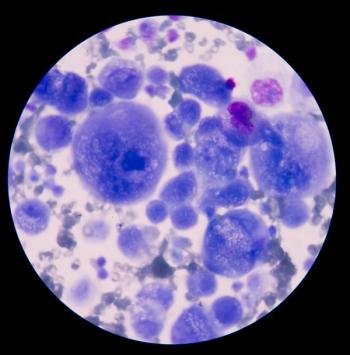
Replacing vincristine with polatuzumab vedotin in R-mini-CHOP, although it hasn’t increased grade 3/4 hematologic toxicity, may increase gastrointestinal adverse effects in a cohort of frail patients with diffuse large B-cell lymphoma.

A Satellite Sessions program at the Yale Cancer Center discusses treatment paradigms and unmet needs in multiple myeloma as well as transplantation, bispecific T-cell engaging therapies, and the importance of collaborative decision-making in clinical practice.

Venetoclax plus obinutuzumab with or without ibrutinib demonstrates superiority over standard chemoimmunotherapy in fit patients with chronic lymphocytic leukemia.
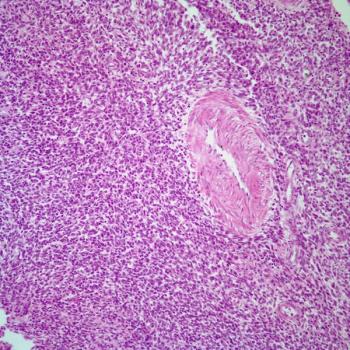
The FDA accepts a supplemental biologics license application for dostarlimab plus chemotherapy in the treatment of mismatch repair deficient/microsatellite instability-high advanced or recurrent endometrial cancer based on data from a prespecified interim analysis of the phase 3 RUBY/ENGOT-EN6/GOG3031/NSGO trial.

Among patients with colorectal cancer who are ineligible for intensive chemotherapy, trifluridine/tipiracil plus bevacizumab yielded similar survival outcomes compared with capecitabine plus bevacizumab.

Dostarlimab produces a survival benefit vs placebo in combination with standard of care therapy regardless of whether patients had mismatch repair deficient/microsatellite instability-high disease.

The association between use of a telegenetics service and lower likelihood of germline testing was statistically significant among black veterans with cancer, according to a recent retrospective cohort study.

Data from a retrospective cohort study indicate that nearly all patients receiving chemotherapy for small cell lung cancer in the community setting appear to experience myelosuppressive toxicities.

Data from a cohort study suggest MGMT promoter methylation could serve as a stratification factor for patients with low-grade and anaplastic gliomas harboring IDH–wild-type or IDH-mutant and co-deleted tumors.
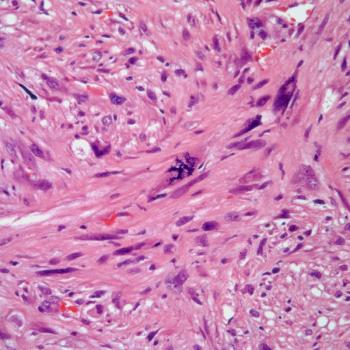
Patients under the age of 3 with neuroblastoma experienced no significant negative impact on survival when their disease was reclassified from high-risk to intermediate-risk and their therapy was thusly reduced.

Synchronous disease appears to have a more hormone dependent transcriptional profile than metachronous disease, according to a retrospective review of patients with metastatic castration-sensitive prostate cancer.

Axicabtagene ciloleucel may prolong survival and improve outcomes vs standard-of-care therapy in older patients with relapsed/refractory large B-cell lymphoma.
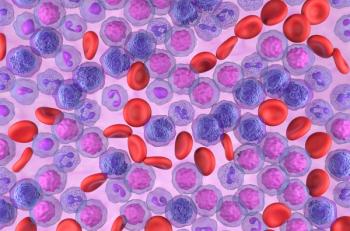
Voruciclib plus venetoclax appears to yield no dose-limiting toxicities in a small population of patients with acute myeloid leukemia, according to early findings from a phase 1 study.

Manufacturers plan to halt further development of milademetan for liposarcoma following the publication of topline results from the phase 3 MANTRA trial.

Plans have been made to file a new drug application in China for roxadustat as a treatment for chemotherapy-induced anemia in those with non-myeloid malignancies.

Trial findings indicate melatonin may be a potentially effective solution for reducing the incidence and severity of cancer-related fatigue among patients with breast cancer.

Patients with human immunodeficiency virus and cancer may derive clinical benefit from immune checkpoint inhibition with no excess toxicity in non–small cell lung cancer and other cancers.

Rituximab plus bendamustine and cytarabine continues to show clinical efficacy and favorable outcomes in a population of elderly patients with mantle cell lymphoma.

A phase 2 trial indicates that limited surgery and post-operative proton therapy result in a high rate of tumor control and less severe complications in young patients with craniopharyngioma.

Investigators identify several potential first time risk factors of long-term outcomes in patients with HER2-positive breast cancer with or without a pathologic complete response.

Among those with multiple myeloma, Hispanic patients may experience worse outcomes such as in-hospital mortality vs other ethnic groups.

C. Ola Landgren, MD, recaps a recent panel discussion of the rapidly changing treatment landscape in multiple myeloma, and prospects for future development.

An additional 5 years of adjuvant aromatase inhibition following initial therapy may improve survival outcomes among disease-free patients with postmenopausal breast cancer, according to results from the phase 3 AERAS study.

A post hoc analysis of the phase 3 TITAN trial highlights an association between PSA decline and survival among patients with metastatic castration-sensitive prostate cancer who were treated with apalutamide plus androgen deprivation therapy.

Investigators of a phase 1/2 trial report that CAR T cells targeting disialoganglioside GD2 may result in long-lasting antitumor activity in young patients with high-risk neuroblastoma.

Treatment with socazolimab plus carboplatin and etoposide appears safe in patients with small cell lung cancer, according to preliminary phase 1 study findings.

Findings from a recent phase 1b study suggest that magrolimab plus azacitidine may be an “important addition” to the higher-risk myelodysplastic syndrome treatment landscape.
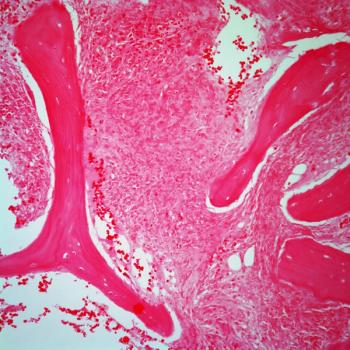
The addition of pembrolizumab to conventional chemotherapy appears tolerable and effective in a cohort of patients with relapsed/refractory classic Hodgkin lymphoma, according to data from a phase 2 trial.

The novel radiotherapy Iomab-B prolongs survival and improves clinical outcomes among patients with relapsed/refractory acute myeloid leukemia, according to data from the phase 3 SIERRA trial.